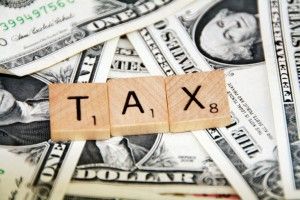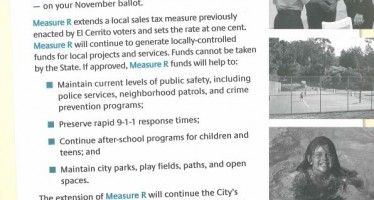BOE: New services tax could boost CA revenue by $122 billion
Placing a tax on business services in California has the potential to raise an additional $122.6 billion annually for state and local governments, according to a recent Board of Equalization study. A services tax could become a reality if Senate Bill 8 is approved by the Legislature and signed by Gov. Jerry Brown.
Although SB8 has yet to be considered by a policy committee, legislators are keen to see increased funding and stabilized revenue for state programs, while leaders in California’s $1.45 trillion services industry are panicking and threatening to leave the state. The BOE is concerned about the major bureaucratic expansion needed to administer the new tax.
 The bill, dubbed the “Upward Mobility Act” by its author Sen. Bob Hertzberg, D-Van Nuys, is actually intended to increase tax revenue by only $10 billion. It proposes to dispense $3 billion of that to K-14 education, $3 billion to local governments, $2 billion to higher education and $2 billion to earned income tax credits for low-income residents.
The bill, dubbed the “Upward Mobility Act” by its author Sen. Bob Hertzberg, D-Van Nuys, is actually intended to increase tax revenue by only $10 billion. It proposes to dispense $3 billion of that to K-14 education, $3 billion to local governments, $2 billion to higher education and $2 billion to earned income tax credits for low-income residents.
In addition, the bill states that it “would enhance the state’s business climate, create jobs, and incentivize entrepreneurship by evaluating the current corporate income tax to determine whether it is meeting its intended purpose while at the same time linking changes to a more reasonable minimum wage.”
The bill exempts health care and education services as well as businesses with less than $100,000 in annual gross sales. The services tax would not replace the state sales tax, which brought in $48 billion in 2013-14 — equivalent to $1,300 for each California resident, according to the Legislative Analyst’s Office.
According to the bill, a services tax is needed to keep up with the changing nature of the California economy, and provide a better balance and less volatility in government revenue:
“Over the past 60 years, California has moved from an agriculture- and manufacturing-based economy to a services-based economy,” the bill said. “As a result, state tax revenues have become less reliant on revenues derived from the Sales and Use Tax on goods and more reliant on revenues derived from the Personal Income Tax.
“In 1950, the Sales and Use Tax comprised 61 percent of all state revenues; today, it accounts for about 30 percent. The Personal Income Tax accounted for 12 percent of total state revenues in 1950; today, it accounts for more than 60 percent.
“Moreover, California’s General Fund tax collections are heavily dependent on the earnings of its top earners. This has led to dramatic revenue swings year over year … [which] have led to the suffering of California’s residents.
“Essential services, such as health care and child care for low-income families, were cut at a time when they were needed most. In addition, the state cut billions of dollars to education, including adult vocational and literacy education, which could have helped low-income families recover from the recession.
“Relying on the wealthiest taxpayers to support California’s needs is outdated and dangerous fiscal policy. Not only does it increase the uncertainty of tax collections, but there is evidence that California’s high tax rates may be driving high income earners out of the state, which only deepens revenue shortfalls.”
Business services comprise 80 percent of the economy today, according to the bill. Exempting them creates inequities; for example, taxing the purchase of TurboTax software but not taxing H&R Block.
The bill seeks to make three changes to the tax code:
- Broaden the tax base by imposing a sales tax on services to increase revenues.
- Enhance the state’s business climate and incentivize entrepreneurship and business creation by evaluating the corporate income tax to determine whether it is meeting its intended purposes, including whether it is borne equitably among California’s businesses and what impact it has on the business climate, while at the same time linking changes to a more reasonable minimum wage.
- Examine the impacts of lowering and simplifying the personal income tax while maintaining progressivity. The measure’s goal is to reduce personal income tax rates for low-and middle-class-income households so that families earning $100,000 pay only $1,000. The revenue reductions would phase in when new revenues replace revisions to the personal income tax and corporate tax.
The Board of Equalization was asked by the Senate Governance and Finance Committee, which Hertzberg chairs, to analyze the services tax. On April 14, BOE staff issued its $122.6 billion revenue estimate along with a fact sheet listing numerous concerns about the implementation of the tax. Those concerns include:
- The BOE’s operations will be significantly impacted. The BOE currently has over 1 million registered taxpayers who report sales tax on tangible personal property sales. Extending a broad-based tax on service providers’ sales could add millions of additional taxpayers — the largest expansion of BOE’s scope and role since sales and use tax was first established in the 1930s.
- Extensive outreach and taxpayer educational efforts would be necessary. A broad-based tax on services would require mass notification, educational efforts and outreach services in a short period of time.
- Adequate lead time is critical. [A] 12-month lead time would NOT provide sufficient time to prepare for and administer a broad-based tax.
- Definitions of taxable and nontaxable services must be clear and comprehensive.
- A tax on certain services provided to or by interstate businesses raises uncertainties in determining the portion of the service performed in California, and any proposed legislation should sufficiently address this issue. For example, what portion of the charges for a national advertising campaign would be subject to a proposed tax in California?
- Different tax rate on sales of services and sales of goods adds complexity.
- The financial impact on service providers who would be required to register and report sales tax cannot be minimized. It would be necessary for service providers to maintain point-of-sale systems, or similar software, to account for and properly remit sales tax. The cost for such systems would cause significant hardship in many cases.
- As significant consumers of services, all levels of government would be impacted by a tax on services.
- Potential for referendum or repeal. If a tax on services is suspended or ultimately repealed, the state may not recover costs associated with the expansion. Four states — Florida, Massachusetts, Maryland and Michigan — all enacted and then later repealed a tax on services.
- “A sales tax on services would dramatically grow the state’s multi-billion dollar underground economy, requiring greater investments of time and resources to combat it by the BOE and other state and local government agencies.”
 At the BOE’s April 28 meeting, several board members expanded on those concerns. Board member Diane Harkey said she’s concerned about trying to enforce the tax on small businesses. “I for one don’t want the BOE to once again be hunting down all the little guys to try to eke a few dollars out of them,” Harkey said.
At the BOE’s April 28 meeting, several board members expanded on those concerns. Board member Diane Harkey said she’s concerned about trying to enforce the tax on small businesses. “I for one don’t want the BOE to once again be hunting down all the little guys to try to eke a few dollars out of them,” Harkey said.
“So I’m not real pleased with this. I think it’s going down a path that, unless we totally overhaul all taxes in the state, this probably doesn’t work. And I think we’ll build up a ton of opposition. I do appreciate your study. But in reality, the take would not be that [much] in real terms. I think we’d be gathering sufficiently less.”
Business leaders have expressed their concerns to Harkey.
“They were very panicked about this bill,” she said. “[One] industry representative said, ‘We’re planning expansion here and … we’re not going to go forward if this is going to happen. People watch California. And, you know, this academic discussion we’re having could very dramatically affect capital investment.”
Board member George Runner is concerned that the BOE might have to quadruple its staffing to 20,000 employees to deal with an additional 2.5 million businesses paying the services tax. But, he said, the BOE analysis is a good starting point for a discussion of the impacts of the tax.
“I look at this as just base information,” said Runner. “And then it’s going to be up to the legislators down the street to figure out how to narrow the bill. I think, as Sen. Hertzberg has said, he’s got some thoughts in his head in regards to what [services] he’s going to include and exclude.
“And I think the next discussion that’s going to take place is who’s in and who’s out. I’ve heard from lots of folks in the industries in terms of who are concerned about it, feeling like this gives them something, some real meat for them to deal with it.”
Board member Jerome Horton said he hopes legislators will not focus on taxes simply as revenue generators.
“If you look at what I believe the initial purpose that the founding fathers had when it came to taxation, was to modify the behavior,” he said. “If the behavior that we want in California is to create jobs, if the behavior that we want is to address poverty and those things in our society, I believe we can find a consensus in order to be able to fund that.
“Part of the challenge, I think, is there’s folks who fundamentally believe that the money isn’t spent right, and the return on the investment isn’t there.”
Those folks include the California Taxpayers Association, whose fiscal policy director, Therese Twomey, has dissected the idea of taxing services.
“In addition to problems related to competitive disadvantages, job loss and tax administration, taxes on services raise a host of other concerns, including increasing costs for government, disproportionately impacting small businesses, tax pyramiding, etc.,” she said in a CalTax newsletter.
Hertzberg responded to the BOE analysis in a press release.
“This landmark study confirms that California’s economy has undergone a revolution,” he said. “Eighty percent of California’s economy is now providing services, not goods, and most of these services are untaxed, making California more dependent on personal income taxes, which fluctuate year to year. It is that dependence on an unstable revenue source — not high taxes — that threatens our state’s economy.”
He noted that the BOE estimate overstates the revenue expected from his bill because the estimate includes education and health-care services, which the bill excludes. “Details about SB8 will continue to unfold during the year; its first policy hearing has not yet been set,” he said.
Related Articles
Senate Drowns Steinberg Water Bill
MAY 5, 2011 By KATY GRIMES In a highly unusual turn of events, a high-profile water bill authored by Senate
Is local tax measure success a sign of things to come?
As usual, Michael Coleman’s California City Finance website has an excellent recap of local tax measures and how they fared in
Cash flows to committee taking up optometry bill
When doctors expressed concerns about legislation to expand the scope of practice for pharmacists, the state’s medical professionals all agreed





